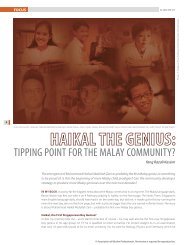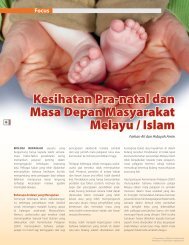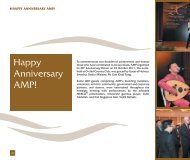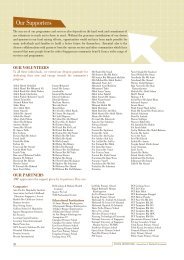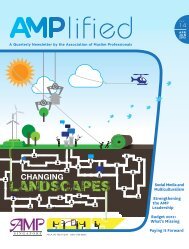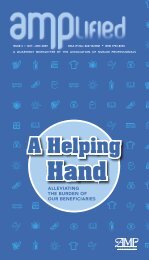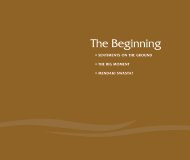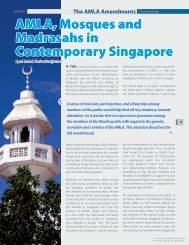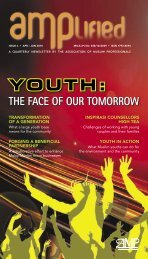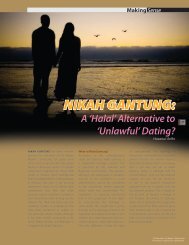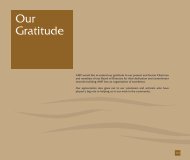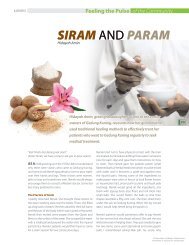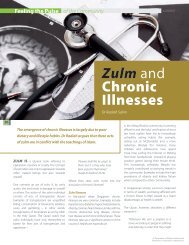The AMLA Amendments - Association of Muslim Professionals
The AMLA Amendments - Association of Muslim Professionals
The AMLA Amendments - Association of Muslim Professionals
You also want an ePaper? Increase the reach of your titles
YUMPU automatically turns print PDFs into web optimized ePapers that Google loves.
KARYAWAN<br />
<strong>The</strong> <strong>AMLA</strong> <strong>Amendments</strong> <strong>AMLA</strong> & Social Resilience Capital<br />
Women’s Woes<br />
In many instances, wives do not even bother to seek<br />
maintenance. Those who go on to divorce share, such<br />
as this one: “My husband did not provide maintenance<br />
while we were married. Why would I think he will provide<br />
for my family when we are divorced” <strong>The</strong>se women<br />
know their rights to maintenance but experience<br />
teaches them to look elsewhere to sustain themselves.<br />
maintenance to their wives and children. It is important to stress<br />
from the onset that the ideas presented in this article emerge from<br />
my eleven years <strong>of</strong> clinical work with Malay/<strong>Muslim</strong> families and<br />
thus may be reflective only <strong>of</strong> this clientele group.<br />
Why Men Do Not Maintain <strong>The</strong>ir Families Post-Divorce<br />
Money Problems Made Worse<br />
<strong>The</strong> lack <strong>of</strong> knowledge is rarely the reason men falter. In cases <strong>of</strong><br />
non-maintenance, many forces influence the men’s maintenancegiving.<br />
<strong>The</strong>se men can be loosely classified in three categories<br />
– men who cannot pay, men who do not want to pay, and men<br />
who cannot and do not want to pay.<br />
<strong>The</strong> first may be genuine hardship cases. After all, collectively, we<br />
are an economically challenged community, with lower education<br />
levels and a corresponding lower ability to fulfill basic familial<br />
functions. According to the General Household Survey 2005, the<br />
median monthly household income for Malays was lower than<br />
the national average at $3,100 in 2005, almost $1,500 and $1000<br />
below that for the Chinese and Indian communities respectively.<br />
Two in three <strong>of</strong> those in the workforce have secondary education<br />
or lower. <strong>The</strong> average household size <strong>of</strong> Malay families is 4.1,<br />
higher than the national average <strong>of</strong> 3.6. On top <strong>of</strong> this, 53.6% <strong>of</strong><br />
married Malay females (20 to 59 years) are economically inactive<br />
– higher than the figures for other ethnic groups.<br />
Thus, we may extrapolate that the typical Malay man is a lower<br />
educated sole breadwinner who earns less than $2,000 but has<br />
many mouths to feed. We see men who genuinely struggle with<br />
issues <strong>of</strong> maintenance, on top <strong>of</strong> other things, as they do not bring<br />
home enough or have difficulties finding and sustaining work.<br />
<strong>The</strong>n, <strong>of</strong> course, there are those who are incarcerated. It also does<br />
not help that many men stonewall when faced with financial<br />
problems instead <strong>of</strong> engaging their spouse in problem-solving.<br />
Alternatively, they engage in unconstructive behaviour like<br />
gambling, drinking, spending time with friends to cope with their<br />
problems – causing further damage to their relationship. Others<br />
have affairs to escape.<br />
Will this latest amendment to <strong>AMLA</strong> then make it easier<br />
for women to claim their maintenance and consolatory<br />
gift, and thus aid them to fulfill their roles as single<br />
parents more effectively Not necessarily. As long as the<br />
Malay male is economically weak, women may still find<br />
that seeking the legal route does not help. In fact, by<br />
enforcing maintenance orders on such men, we may<br />
be crippling their ability to feed their new reconstituted<br />
family and cause further tension. This may perpetuate a<br />
new cycle <strong>of</strong> dysfunctionality.<br />
<strong>The</strong>re are also women who do not wish to enforce<br />
orders because <strong>of</strong> the likelihood <strong>of</strong> fines or a jail term<br />
for errant ex-husbands. Such consequences reduce<br />
the probability <strong>of</strong> receiving maintenance at all. It may<br />
also increase the risk <strong>of</strong> stigmatisation for the women<br />
who are blamed for causing pain and difficulties to<br />
the newly reconstituted families or even the men’s<br />
family-<strong>of</strong>-origin.<br />
When Values Matter<br />
A man’s willingness to pay maintenance is mediated by<br />
his values, beliefs and attitudes towards providing for his<br />
ex-wife and children. <strong>The</strong> Court’s attempts to facilitate<br />
payment are also not foolpro<strong>of</strong>. In some cases where<br />
the Court ordered for payments to be deducted from<br />
the ex-husband’s monthly salaries, the men simply left<br />
their jobs and found new ones. It takes perseverance<br />
on the women’s part and much time and grief going<br />
back and forth to the Court to seek and claim what they<br />
consider as rightly theirs or their children’s.<br />
As long as our Malay men lack the capacity and right<br />
values to support women and children financially, it will<br />
be difficult to apply the legal system to ease the burden<br />
<strong>of</strong> single-parenting. As long as the values <strong>of</strong> compassion,<br />
honour and responsibility are not upheld, women may<br />
find it more expedient to fend for themselves or depend<br />
on formal sources <strong>of</strong> support.<br />
Engaging Men<br />
<strong>The</strong>re are many empowerment programmes for single<br />
female heads <strong>of</strong> household presently. <strong>The</strong> Singapore<br />
<strong>Muslim</strong> Women’s <strong>Association</strong> (PPIS), the <strong>Association</strong> <strong>of</strong><br />
19



